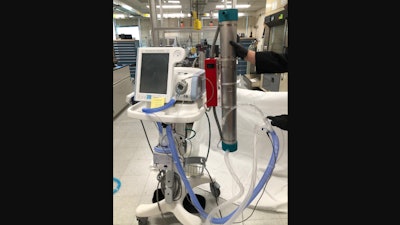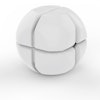
ALBUQUERQUE, N.M. — In less than a month, Sandia National Laboratories converted 100 respiratory machines New Mexico hospitals already had on hand into machines that can safely be used as ventilators to help treat patients with severe cases of COVID-19.
Non-invasive ventilators that use masks instead of tubes, BiPAP and CPAP machines, cannot normally be used to treat patients with COVID-19 because they expel a patient’s breath into the room, contaminating the area with virus droplets and putting medical staff at risk of exposure.
So, a team of Sandia researchers developed pathogen management kits. The kits can be attached to respiratory machines and use ultraviolet light to disable COVID-19 and other pathogens before a patient’s exhaled breath is circulated back into the hospital room.
Sandia partnered with Presbyterian Healthcare Services and the University of New Mexico Hospital to make sure the team was working to best meet the needs of local hospitals. The hospitals provided information about the type and amount of equipment they had available for conversion and what modifications would be most helpful for safely treating patients with COVID-19.
The project progressed from the idea phase to design, testing and validation within about three weeks. After a prototype of the kit was built and attached to a non-invasive ventilator, the team conducted biological and aerosol testing to ensure the design was safe and effective.
Sandia is ready to deliver its first round of pathogen management kits for non-invasive ventilators for distribution to hospitals like Presbyterian and the UNM Hospital, effectively increasing New Mexico’s ventilator count by 100.
The team plans to transfer the pathogen management kit technology through a Cooperative Research and Development Agreement to a regional manufacturer to increase the production rate substantially.
The team also is designing an alarm system that can be added to any ventilator to help keep patients safe when non-standard equipment is being used and will help relieve some of the stress of a high patient-to-medical-care-worker ratio by alerting healthcare workers to any problems.
This project is one of about 50 that Sandia is currently working on to help fight COVID-19 and the research and development of the kit was funded through Laboratory Directed Research & Development.






















